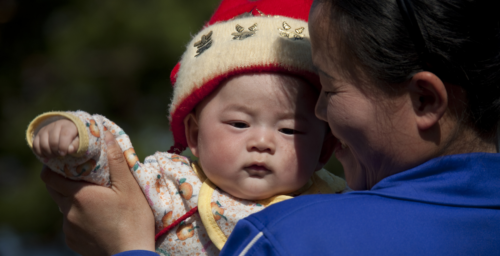Kim Jong-un's recipe to counter a low birthrate: More Communist mothers
The North Korean dictator recently addressed women asking them to counter the anti-socialist tendencies in their children, which are pushing many young couples not to have children. While the birthrate has fallen to 1.8 and the population is beginning to age, the real cause of the decline lies in the frequent famines.
Seoul (AsiaNews) – North Korea’s birthrate is plunging and an anti-socialist behaviour is growing among the new generation. To halt this, North Korean leader Kim Jong-un said that the "primary revolutionary task" of mothers is to be communist.
“Unless a mother becomes a communist, it is impossible for her to bring up her sons and daughters as communists and transform the members of her family into revolutionaries,” he said in a recent speech.
“Stopping the decline in birthrates and providing good childcare and education are all our family affairs that we should solve together with our mothers,” he added.
Kim Jong-un touched upon this and other issues in an address he delivered to thousands of North Korean women at the National Mothers’ Meeting in Pyongyang on 2-3 December, the fifth such event and the first in 11 years.
Like South Korea and other East Asian countries, North Korea is facing a declining birthrate, although, with a fertility rate of 1.9 children per woman in 2022 (which will drop to 1.8 in 2023 according to estimates), the problem is not yet as bad as in South Korea.
The figure is, however, lower than in many other developing countries, so it is likely to become as a major issue to be urgently addressed.
In 2004, seniors over 65 years were 7 per cent of the North Korean population. Since then, North Korean authorities have had to face an aging population, while maintaining the policy of self-sufficiency to counter international sanctions, relying on the mobilisation of domestic labour to keep its economy afloat.
The problem in North and South Korea are similar but there are differences.
In the South, the collapse in the birth rate is mainly due to the new lifestyle of the younger generation, the huge costs of raising a child, and a real estate market with prices out of reach for most families.
This is not the case in North Korea where the state provides free housing and education to all, but also controls the labour market. Here too though, attitudes towards marriage are changing in the younger generation.
According to data from the Population Reference Bureau, in 2008 only 4 per cent of women between the ages of 30 and 34 had never been married; presently, also due to exposure to South Korean pop culture that arrives in the North illegally, young people reject arranged marriages, live together without marrying, or do not find a partner at all.
For Kim Jong-un, these are anti-socialist behaviours that must be stopped through the family education provided in particular by mothers. But are education and fertility really issues that women should be dealing with?
In the 1970s and 1980s, North Korea faced the opposite problem and implemented birth control policies, which experts say are not the cause of the current aging population. The actual reason is the famine in the 1990s and the consequent malnutrition that still affects North Korea today.
In fact, the country has faced regular food shortages in the last 30 years; as a result, North Koreans prefer to avoid having another child so as not to have an extra mouth to feed.
According to UN data, the undernutrition rate in North Korea reached 41.6 per cent in 2021, a considerable rise from the 33.8 per cent in 2004-2006. In addition, in 2020, 18.2 per cent of children under the age of five were stunted.
In 2019, 33.9 per cent of North Korean women aged 15 to 49 suffered from anaemia, a condition that has a significant impact on their ability to get pregnant.
Women who don't get enough iron are more likely to suffer from anovulation, lack of ovulation, and poor egg health, making pregnancy up to 60 per cent more difficult than women with normal iron levels.
12/02/2016 15:14
17/03/2010







.png)










